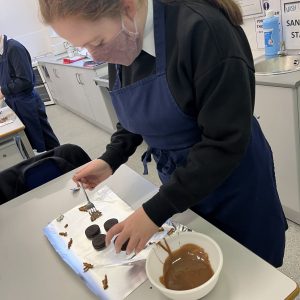Mrs E. Murphy (HOD)
What will I study?
| Year 8 | Year 9 | Year 10 |
|---|---|---|
| Introduction to Home Economics
Hygiene in the kitchen Safety in the kitchen Washing up routine The cooker – label parts The uses of a range of equipment used in school and in the home. Healthy Eating Why we eat food Nutrients and their function Five food groups on the balanced plate Portions of foods we are recommended to eat. Healthy Eating guidelines Benefits of eating breakfast Personal Development Feelings and Emotions Managing Influences and Making decision |
Healthy Eating
Diet and Health Eat Less Sugar Eat more Fibre Personal Development Kitchen Equipment Self-concept Managing Change Living By Myself Advertising |
Food Labelling
Consumer Studies What is a consumer? Budgeting Vegetarianism The Ethical Consumer Meal Planning
Citizenship Diversity around me Human rights and social responsibility |
How will I be assessed?
Assessments (Practical and Theory)
Useful links
www.bbc.co.uk/health
www.bhf.org.uk
www.citizensadvice.org.uk
www.coeliac.co.uk
www.consumerfocus.org.uk
www.consumerline.org
www.dairycouncil.co.uk
www.diabetes.org.uk
www.eating-disorders.org.uk
www.foodafactoflife.org.uk
www.food.gov.uk
www.gccni.org.uk
www.lmcni.com
www.nspcc.org.uk
www.nutrition.org.uk
www.oft.gov.uk
www.salt.gov.uk
www.safefoodonline.com
www.vegsoc.org
What will I study?
Year 11 Unit 1 Content includes the following
- The Family and Parental responsibilities
- Reproduction
- Pregnancy
- Diet and lifestyle during pregnancy
- Birth including stages of labour, options and pain relief
- Newborn baby including characteristics and reflexes
- Feeding the newborn baby
Year 12 Unit 2 Content includes the following
- Dietary needs of the child 0-5 yrs
- Child Health and Education
- Child development
- Social development
- Physical development
- Intellectual development
- Communication development
- Emotional development
Unit 3 Controlled Assessment
Students carry out a task that develops unique transferable skills.
Students use the given task title to choose one issue for further research. They plan and carry out activities to produce an outcome and then evaluate all aspects of the task
How will I be assessed?
- Unit 1 Parenthood, Pregnancy and the Newborn Baby at the end of Year 11 – 30%
- Unit 2 The Development of the Child at the end of year 12 – 30%
Controlled Assessment– 40% –
One investigation task which will be completed during Year 12 – 40%
Useful links
www.anred.com
www.bbc.co.uk/health
www.bhf.org.uk
www.citizensadvice.org.uk
www.coeliac.co.uk
www.consumerfocus.org.uk
www.consumerline.org
www.dairycouncil.co.uk
www.diabetes.org.uk
www.eating-disorders.org.uk
www.foodafactoflife.org.uk
www.food.gov.uk
www.gccni.org.uk
www.lmcni.com
www.nichsa.com
www.nicma.org
www.nos.org.uk
www.nspcc.org.uk
www.nutrition.org.uk
www.oft.gov.uk
www.pachelp.org
www.parentsadvicecentre.org
www.publichealth.hscni.net
www.rospa.org.uk
www.salt.gov.uk
www.safefoodonline.com
www.vegsoc.org





